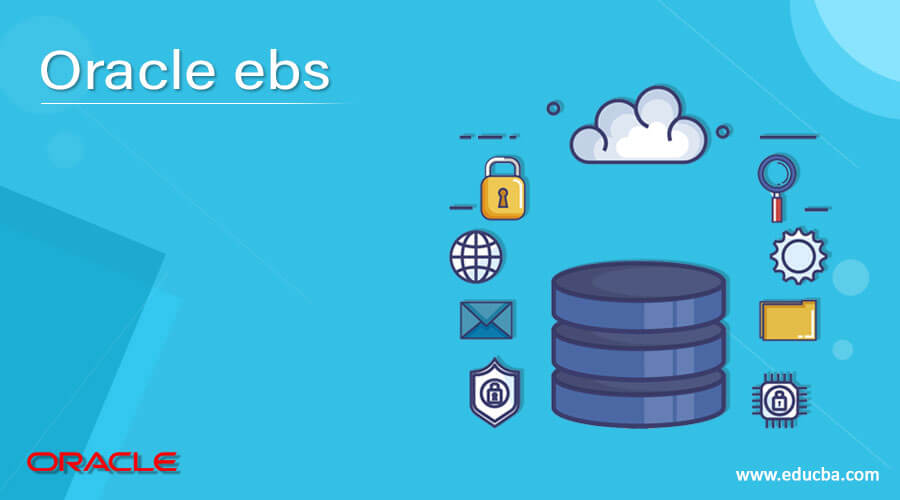
Introduction to Oracle ebs
Oracle EBS includes different types of integrated business applications that are provided by the oracle. The full form of EBS is the Oracle E-Business Suite. Basically, it is used to combine all the oracle applications that are helpful to businesses with their wide variety of processes. Mainly it focuses on enterprise resource planning, how we can build a customer relationship that is customer relationship management and supply chain management. Oracle database management system is the most widely used oracle enterprise software package and is also the core technological driver of the package. The EBS mainly allows us to upload and analyze data as well as mapping metadata for Hyperion EBS. The first time it was released was in 2001 and after that oracle has continuously updated the EBS packages.
How Oracle ebs works?
Now let’s see the working mentioned below:
Basically, it is work on different major factors as follows.
-
Enterprise Resource Planning
The main thing about the EBS suite is that it works the same as an ERP application. The EBS suite allows users to have a single resource truth for uploading and analyzing their data. In which we can include Hyperion EBS integration which provides the mapping functionality and that is helpful for extracting data and metadata. The main purpose of Enterprise Resource Planning is to improve collaboration work and also reduce the cost.
-
Customer Relationship Management
Customer Relationship Management means CRM, in which that single source of truth for all of its CRM processes. Mainly CRM is used to build relationships with customers to improve the business that means it is a business intelligence application tool that is helpful to improve the business.
-
Supply Chain Management
Oracle supply chain management is the most important factor in EBS because it brings all various feedback related to products or services. This is helpful to design the product and how we can provide it better to the customer. It mainly focuses on finding errors and bugs with the huge amount of data produced. It includes order and price management well as also deals with logistics and transportation management.
-
Oracle Financials
This includes cash management, which is payables, receivables, and general ledger.
-
Human Resource Management System
This helps to manage all recruitment process and this module gives users real-time views of all HR activities, including training, time management, payroll, and other benefits.
-
Oracle Logistics
The oracle logistics allow the user to plan, manage and control the flow of products and services within the business. It also provides information about the future plan as well as safety stock within the peculiar warehouse.
-
Order Management
This module is used to manage the entire business sales order management process.
-
Transportation Management
Transportation management is used to manage the transportation planning and execution capabilities of third-party logistics providers and shippers. Advantages of transportation management are reducing the transportation costs as well as customer service.
-
Warehouse Management System
Oracle warehouse management system is used to manage goods and their information within the distribution process. This module provides business processes that can be helpful for managing the employee, equipment within the distribution process.
Advantages and disadvantages
Now let’s see what are the advantages and disadvantages are as follows.
Advantages
- Oracle ebs is used to manage global businesses.
- It also helps to facilitate decision-making.
- Oracle is used to reduce the cost of products and provides better service to the customer.
- The main advantage is that it helps us to improve the corporate performance.
- Oracle ebs support different tools such as CRM, ERP, and SCM.
- With the help of CRM tools, we manage the order of customers, provide better service to the customer that means we can build a relationship with the customer, this is nothing but the CRM.
- Oracle ebs is very fast and reliable and it has the ability to customize the aas per the requirement.
Disadvantages
- The GUI of oracle ebs is not straightforward and it is not user-friendly.
- Oracle ebs required a high maintenance cost which is not affordable for small organizations.
- Oracle ebs deployment and customization required more efforts as well as it also required coordination between departments and developers.
- In oracle ebs online patching required more error-free.
- The problem in launching the multiple forms sessions.
Examples
Now let’s see different examples of oracle ebs as follows.
First, establish the connection for oracle ebs suite and REST service as follows.
- First, we need to login into the oracle integration cloud service.
- After that click on the connection and create a new connection with connection name, identifier, connection role, and description as shown in the below screenshot.
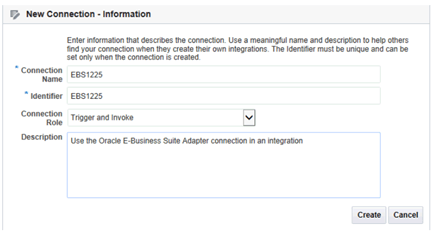
In the above screenshot, we show how we can build the connection. This is the reference screenshot from the official oracle website.
After that, we need to select an agent group
Select the desired agent group like EBS after that we need to specify the connection details as shown in the above screenshot. Then test the connection and save the setting. Selecting agent group as shown below screenshot.
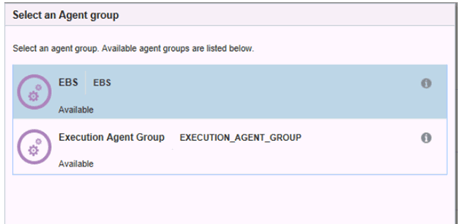
So we successfully establish the connection and also we add the EBS agent group. Then the next step is to select the web services as shown in the screenshot below.
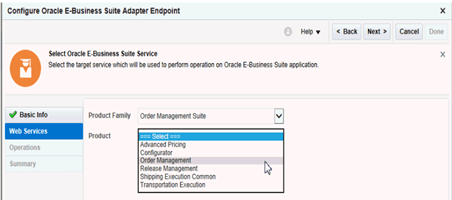
In the next step, we need to select the sales order services API from the product list as shown in the above screenshot. Selecting sales order as shown in the below screenshot.
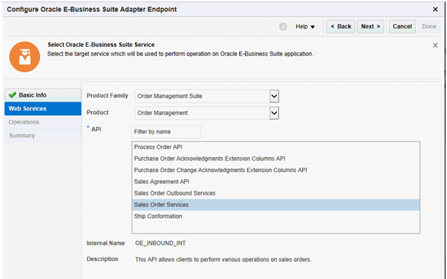
After that, we need to select the process order method from the operation page as shown in the below screenshot.
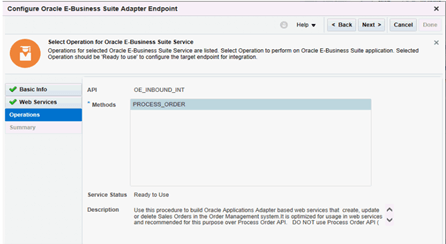
We see the summary by using the summary page option, below screenshot shows the summary of the target endpoint.
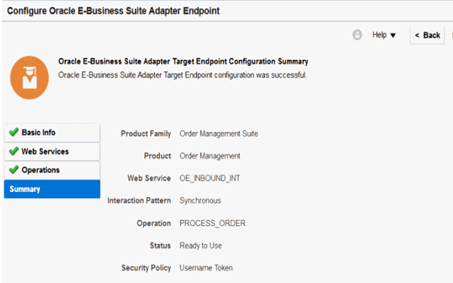
Above mentioned all screenshots we take from the official website of the oracle.
In this way, we can perform different operations with the help of oracle ebs.
Conclusion
We hope from this article you have understood about the Oracle ebs. From this article, we have learned the different examples of Oracle ebs. We also see what are the advantages of oracle ebs and what are the disadvantages of oracle ebs. From this article, we learned how and when we use the Oracle ebs.
Recommended Articles
This is a guide to Oracle ebs. Here we discusss How Oracle ebs works along with the examples and also see what are the advantages and disadvantages. You may also have a look at the following articles to learn more –

